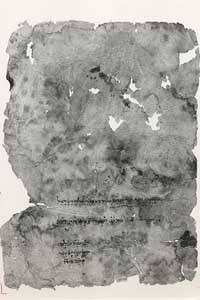Conference in Italy will honor Obadiah, whom Golb studied in early research
By William HarmsNews Office
 The text in the image above reads, “Obadiah the Norman Proselyte who entered the covenant of the God of Israel in the year… (1102), he, Obadiah the Proselyte, has written (this prayer book) in his own handwriting.” | |
A major academic conference will be held in a small city in southern Italy in late March to honor a town celebrity from the Middle Ages, Obadiah the Proselyte, who became known to scholars in the 20th century and whose fame was enhanced nearly 40 years ago in Norman Golb’s pioneering work.
Golb, the Ludwig Rosenberger Professor of Jewish History and Civilization in Near Eastern Languages & Civilizations, will serve as honorary president of the International Conference on Chronicler-Musician Obadiah the Proselyte, a convert to Judaism who set Hebrew texts to music similar to Gregorian chant.
The fragments of Obadiah’s works will be performed at the conference, which will be held in Oppido Lucano. The event will open with introductions by Golb, presidents of local and regional government, and other dignitaries. In addition to the musical performances, scholars will present papers on multiculturalism in the Middle Ages, visit local historical sites, and discuss Jewish life in Near Eastern cities visited by Obadiah.
Full translations of the memoir of Obadiah, who lived from about 1070 to 1140, will be available for the first time at the conference. Golb prepared the English version, and Davide Papotti, a doctoral candidate in Italian studies at the University, prepared the Italian translation. Michael Anderson, a graduate student in Music, collaborated with Golb on editing and preparing Obadiah’s music for publication.
“Obadiah the Proselyte is a very important figure nowadays for people in Oppido Lucano. They’ve even named a street after him,” Golb said.
“Concentrating on a single personality of the high Middle Ages whose knowledge embraced both European and Middle Eastern cultures, the conference promises to be a unique event in the annals of medieval studies and their appreciation in our own time,” reads an announcement of the conference, which brings together scholars from Israel, the United States and several European countries.
Golb will talk about Obadiah’s conversion in its historical context. “He is actually one of a number of converts to Judaism from Christianity during the period,” Golb said.
Obadiah wrote about the persecution of Jews in Europe during the First Crusade. He also wrote about the conversion of the Archbishop of Bari in southern Italy to Judaism in the 11th century. “The information is not mentioned in any church records, but was recorded by Obadiah.”
Obadiah’s memoirs mention a mystic dream he experienced, which was apparently one of the elements that prompted his conversion.
Golb returned to the study of Obadiah the Proselyte, as well as other converts, in materials from the Cairo Genizah, a huge collection of documents now stored in libraries in Britain and elsewhere.
Because he recognized the handwriting of Obadiah on an already known piece of music, Golb in 1965 was able to identify Obadiah as a musician of his times.
“Up until that discovery, it had been thought because of this one manuscript that Gregorian chant had originated in the Jewish community and was then adapted by Christians,” Golb said. Identifying it as being in Obadiah’s handwriting changed that perspective.
The discovery also portrays a deeper understanding of the culture during the Middle Ages, usually considered the Age of Faith in Europe and often characterized by fighting against Muslims and intolerance toward Jews.
The era also was a time of great mobility, as the case of Obadiah shows. His father Dreux was among the Norman conquerors of southern Italy, and Obadiah was born Johannes. His twin brother Rogier became a warrior knight and inherited the family castle, while Johannes entered a monastery where he studied music and religious texts.
He fled to Syria and took the Biblical name Obadiah. From Syria, he traveled to various cities, including Baghdad, where he learned Hebrew with children at a Jewish school.
From Baghdad, he eventually traveled to Cairo, where he apparently gained the high respect of the city’s large Jewish community.
![[Chronicle]](/images/sidebar_header_oct06.gif)